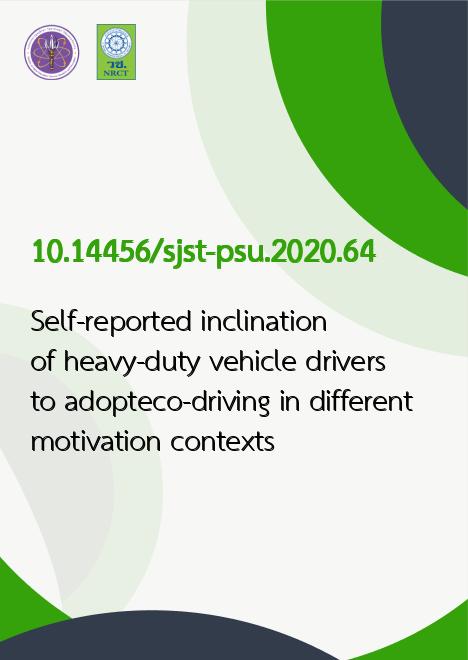
|
Self-reported inclination of heavy-duty vehicle drivers to adopteco-driving in different motivation contexts |
|---|---|
| รหัสดีโอไอ | |
| Creator | 1. Nazam Ali 2. Mongkut Piantanakulchai |
| Title | Self-reported inclination of heavy-duty vehicle drivers to adopteco-driving in different motivation contexts |
| Publisher | Research and Development Office, Prince of Songkla University |
| Publication Year | 2563 |
| Journal Title | Songklanakarin Journal of Science and Technology |
| Journal Vol. | 42 |
| Journal No. | 3 |
| Page no. | 496-503 |
| Keyword | co-driving, Thai drivers, co-driving score, behavioral response, motivation contexts |
| URL Website | https://rdo.psu.ac.th/sjstweb/index.php |
| ISSN | 0125-3395 |
| Abstract | Eco-driving is an emerging field of research. Due to its positive dimensions on fuel-economy and environmentalemissions, it is becoming a well-known concept in transportation industry. Behavioral responses of drivers' readiness to adopteco-driving are studied. Questionnaires are collected from 87 truck drivers working for a logistics firm in Thailand. Eco-drivingwas introduced using three different strategies; changing driving behavior, competition with fellow drivers, and reward or penaltysystems. A five-point Likert scaling system is adopted to record their self-evaluation scoring to practice eco-driving in givencontextual motivations. Results are reported in the form of eco-driving scores and Statistical evaluations to check if the differencein behavioral response is statistically significant. Statistically significantly different results showed that in-relationship (score3.75) and high school drivers (score 4.38) manifested strong motivations in penalty or reward systems while high school driversexhibited great inclinations in changing their driving behavior (score 3.89). |
